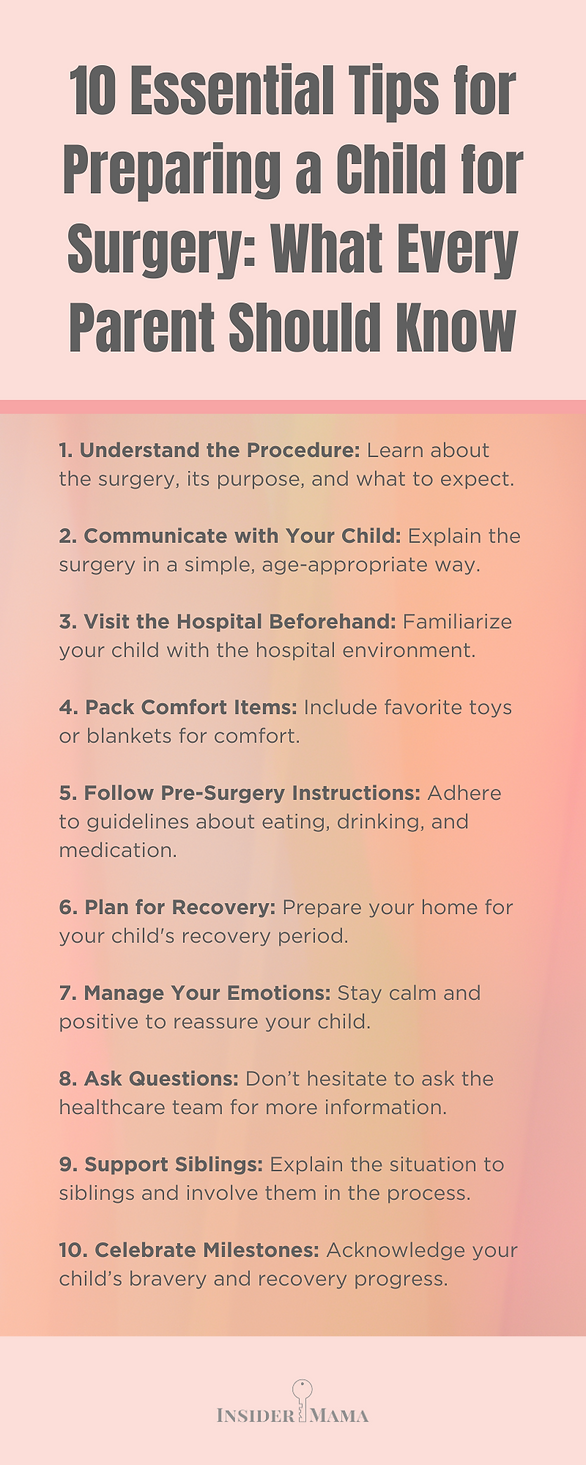
Being a mom to five kids, I’ve been through the tough experience of getting my children ready for surgery more times than I ever thought I would. Recently, we had a really hard time when our daughter, Kaitlyn, had surgery to remove her tonsils and adenoids, and then had to go back to the hospital five days later because of some problems. It’s super hard for any parent to go through their child having surgery. It’s like being on a really stressful emotional ride, full of worries and so many questions. But remember, you’re not going through this tough time by yourself.
I’m writing this article to share what I’ve learned, not just from my own experiences but from what other parents have gone through, too. The goal here is to give you both useful tips and the emotional support that’s really needed during times like these. Let’s go through this together, offering each other advice and support to help both you and your child get through this tough time.
Preparing a Child Before the Surgery
As we get ready for the big day – your child’s surgery day, it’s super important to know how to prepare. This part is all about getting things in order, both for your kiddo and for you, emotionally and with all the stuff you need. Think of it like getting ready for a very important trip. You want to make sure you have everything, and also that you and your little one feel as okay as possible about it.
We’re going to talk about what to do, what to bring, and how to stay strong for your child. This is the time to make sure you’ve got all the ducks in a row. We’ll cover how to talk to your child about what’s happening, how to pack the perfect hospital bag, and even how to handle those normal jitters you both might feel.
Let’s walk through this together, step by step, so when the surgery day comes, you’ll feel like you’ve got this, because, honestly, you really do!
Understanding the Surgery
First things first, understanding what your child’s surgery involves is crucial. Don’t hesitate to ask your child’s doctor any questions you have. Here’s what you need to know:
- The Basics: Understand what the surgery is for, how long it will take, and what the recovery process involves.
- The Team: Learn about the healthcare team who will be taking care of your child. This includes surgeons, nurses, and anesthesiologists.
- The Facility: Familiarize yourself with the hospital or clinic where the surgery will take place. Knowing the layout can help reduce anxiety.
Talking to Your Child About Surgery
Talking to your child about surgery is delicate but essential. Here’s how to do it effectively:
- Be Honest: Use simple, age-appropriate language to explain why the surgery is needed and what will happen.
- Encourage Questions: Let your child ask questions and express their feelings. Answer them honestly and calmly.
- Use Stories and Books: Sometimes, a story or book can help explain things better. Look for resources that talk about hospitals and surgeries in a child-friendly way.
Preparing Emotionally
Preparing your child emotionally is as important as the physical preparation. Here are some tips:
- Stay Positive: Your attitude can influence your child’s feelings. Stay positive and reassuring.
- Role Play: Use toys to role-play the surgery process. This can help your child understand what to expect in a non-threatening way.
- Visit the Hospital: If possible, visit the hospital beforehand. Familiarizing your child with the environment can ease anxiety.
Preparing Siblings
If your child has siblings, they too need preparation. Here’s how to involve them:
- Explain the Situation: Use age-appropriate language to explain why their sibling needs surgery and reassure them.
- Involve Them in the Process: Let them pick a toy or draw a picture for their sibling to take to the hospital.
- Maintain Routine: Try to keep their daily routine as normal as possible. Consistency helps them feel secure.
Financial and Logistical Planning
Surgery can involve financial and logistical considerations. Here’s what to think about:
- Insurance and Costs: Understand what your insurance covers and what additional costs you might incur.
- Time Off Work: Plan for the time you’ll need to take off work. Look into Family Medical Leave Act (FMLA) options if you’re in the U.S.
- Transportation and Accommodation: Plan for how you’ll get to the hospital and where you’ll stay if it’s far from home.
Physical Preparation
Physical preparation is also key. Here’s what you need to focus on:
- Pre-Surgery Instructions: Follow the doctor’s instructions regarding eating and drinking before surgery.
- Pack Comfort Items: Bring your child’s favorite toy or blanket to the hospital for comfort.
- Rest and Nutrition: Ensure your child gets enough rest and proper nutrition before the day of the surgery.
The Day of Surgery
The day of surgery can be hectic. Here’s how to manage it:
- Arrive Early: Get to the hospital early to avoid any rush and have time to settle down.
- Comfort Your Child: Stay calm and comfort your child. Your presence is a huge source of comfort for them.
- Ask Questions: Don’t hesitate to ask the medical team any last-minute questions.

After the Surgery
Alright, moms, we’ve gotten through the surgery day, and now it’s time for the post-surgery phase. This is when we really need to step up because our kids need us more than ever as they begin to heal. It’s like being both the coach and the biggest fan of your child’s recovery journey.
In this section, we’re going to go over everything you can do to make your child feel better after their surgery. We’ll talk about things like making sure they take their medicine and helping them with any special bandages or exercises they might need. Think of it as learning the best ways to care for your child in a soft and comforting way while they regain their strength.
Post-Surgery Care
After surgery, your child’s recovery is paramount. Here’s what to keep in mind:
- Follow Instructions: Adhere to all the post-operative care instructions given by the doctors.
- Pain Management: Be vigilant about managing your child’s pain as advised by the healthcare team.
- Emotional Support: Provide lots of love and emotional support during recovery. Your child might feel vulnerable or scared post-surgery.
After Surgery: The Hospital Stay
If your child needs to stay in the hospital post-surgery, here’s how to manage:
- Understand Hospital Policies: Learn about visiting hours and what items you can bring.
- Create a Comfortable Environment: Bring items from home that will make your child’s hospital room feel more comforting.
- Stay Involved: Be present during doctor rounds if possible and don’t hesitate to ask questions about your child’s care.
Nutrition and Diet
Post-surgery nutrition is crucial for recovery. Here’s what to focus on:
- Follow Dietary Guidelines: Adhere to any dietary restrictions or guidelines provided by the doctor.
- Hydration: Ensure your child stays hydrated, especially if they have restrictions on solid food.
- Healthy Choices: Once they can eat normally, provide nutrient-rich foods to aid recovery.
Managing Follow-up Care
Post-surgery care doesn’t end at the hospital. Here’s how to manage follow-up:
- Keep Track of Appointments: Maintain a calendar of follow-up appointments, therapy sessions, or check-ups.
- Watch for Complications: Be vigilant about signs of infection or any complications and contact the healthcare provider if concerned.
- Rehabilitation: If your child needs physical therapy or other rehabilitation, stay committed to the schedule.
At Home After the Surgery
Now that our little ones are back home after surgery, we’re moving into a new phase of their recovery. Think of your home as a comfy recovery zone, where everything is set up to help your child feel better each day.
In this part of our guide, we’re focusing on tips for turning your home into a great place for your child to heal. We’ll cover how to make their go-to spot in the house super cozy. For example, extra pillows or a soft blanket can make a big difference. We’ll also talk about healthy snacks that are easy to prepare and perfect for a recovering kiddo. And let’s not forget about keeping them gently entertained – maybe with their favorite movies or some quiet, fun activities.
This time isn’t just about the kids, though. It’s also important for you to take care of yourself. We’ll share some ideas for quick, refreshing breaks you can take. Maybe it’s enjoying a peaceful moment with a good book or simply sitting quietly with a cup of coffee while your child rests.
So, let’s get your home ready to be a calm, healing space. With each day, you’ll see your child getting better, and that’s what it’s all about – comfort, care, and lots of love on the road to recovery.
Taking Care of Yourself
Don’t forget to take care of yourself. Here are some tips:
- Seek Support: Don’t hesitate to reach out to family and friends for emotional support.
- Take Breaks: Give yourself some time off when you can. Remember, taking care of yourself is important to be there fully for your child.
- Stay Informed: Keep yourself informed but avoid overwhelming yourself with too much information.
Helping Your Child Cope with Changes
Some surgeries may result in temporary or permanent physical changes. Here’s how to support your child:
- Acknowledge Their Feelings: Allow your child to express their feelings about any changes or limitations they are experiencing.
- Focus on the Positive: Emphasize their strengths and the progress they are making in recovery.
- Seek Support Groups: Sometimes talking to other kids who have gone through similar experiences can be helpful.
Returning to School
Returning to school after surgery can be a big step. Here’s how to make it smoother:
- Communicate with the School: Inform teachers and the school nurse about your child’s surgery and any special needs they might have.
- Plan a Gradual Return: If possible, start with a few hours a day or a few days a week and increase as your child feels more comfortable.
- Address Bullying: Prepare your child on how to respond if they face any negative comments or bullying at school.
Celebrating Milestones
Remember to celebrate the milestones in your child’s recovery. Here’s why it’s important:
- Acknowledge Progress: Celebrating small victories can boost your child’s morale and encourage them.
- Create a Memory Book: Documenting the journey can be therapeutic and a way to look back on how far your child has come.
- Family Celebrations: Have a family movie night or a small party to celebrate milestones in your child’s recovery journey.

Getting your child ready for surgery involves a lot of different things. You need to handle the practical stuff and also be there to support your child and your family emotionally. It’s totally fine to ask for help and make sure you get some time for yourself too. Your child’s strength, along with your love and care, will help make this whole surgery and recovery process go well.



